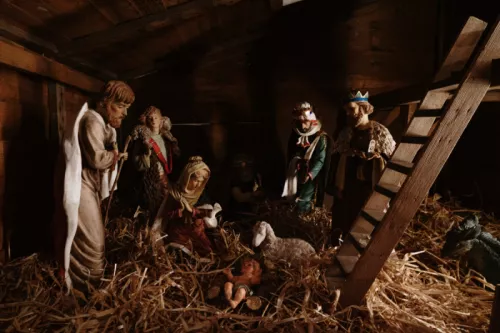Christmas is almost upon us, and many families in the UK will be having joyful – or not so joyful – experiences with nativity plays. But some characters will probably be missing.
For example, nativity plays generally don’t depict all the denizens of Bethlehem who go to sleep, wake up and go about their business, completely ignoring the nativity taking place three doors down. And yet, surely part of the story is those who missed it: “He was in the world, and the world came into being through Him; yet the world did not know Him” (John 1:10).
In the other three gospels, the spotlight is on Jesus and those who interact with Him. This means we can reflect on the responses of those who meet Jesus and spend a lot of time with Him. But it can also give rise to a version of ‘survivor’s bias’: we miss those who fall out of the spotlight quickly, or those who never engage with Jesus at all – including at His birth.
In contrast, those who are most prominent in our crib scenes are those who ‘got the message’: we have the shepherds who abandoned their sheep, the Magi who journeyed through the dead of winter, and of course Joseph and Mary. But we can also forget that all these figures needed help. Mary needed an angelic vision (Luke 1:26 – 38). Joseph was ready to divorce Mary without a vision of his own (Matthew 1:18 – 21). Meanwhile, the Magi followed a star, and the shepherds needed a whole hillside of angel choirs. No one, in short, got to the manger by deduction.
But who are the other people who missed the full picture – and the people we overlook in turn? First, we often forget those who rejected Mary and Joseph, as summarised by Luke 2:7: “There was no place for them in the inn.” Would their reactions have been different had it been known that here was God in the flesh? Or, what about the census officials, in their humdrum task of registering the farmers, shepherds and travellers of Bethlehem? Would the presence of the saviour of the world have merited a footnote in the official records?
Secondly, we may gloss over those who knew that something was significant but failed to see the full story. So, we have the politically-minded inhabitants of Jerusalem, ‘frightened’ with Herod at the report of the Magi (Matthew 2:3). Then there is Herod himself, who soon went to his grave believing that Jesus was a problem he had eliminated.
Lastly and most tragically, we miss the families of Bethlehem in Matthew 2:16 – 18. Their only Christmas story would have been that, one night, their ruler inexplicably sent a detachment of soldiers to massacre their children. How many of these grief-stricken families lived to see Jesus going up to Jerusalem 30 years later, or to hear salvation preached in His name? For most, we must assume that that horrific night was all they know of the story – until Christ comes again and consoles them, as hinted at in Jeremiah’s prophecy (Matthew 2:18, Jeremiah 31:15 – 17).
What might these missing characters mean for us? First, let’s make sure we in turn do not miss God this Christmas – in His word or in the prompting of the Holy Spirit. I know one pastor asks himself each day: “When did I meet God today and when did I miss God today?” Was it in a family member? In someone lonely at church? In someone who had no voice in the recent election? Or perhaps in someone homeless or fleeing violence, as Jesus, Mary and Joseph soon were?
Secondly, let’s remember the obscurity of the incarnation as we come to terms with the recent election. As the opinion pieces continue to multiply, some will be celebrating this result, while others will still be in mourning – and both groups will be in our churches on Christmas morning. To both groups, the Christmas story offers a warning. A journalist writing a Judean ‘decade in review’ in AD 5 – 10 would probably have missed the incarnation. We’d have heard a lot from them about Herod, a few things about Rome, and nothing of the King of kings. And yet there He was. This does not downplay the significance of our political life together. However, it may encourage us to look away from current centres of power if we do not want to miss God at work.
But finally, for those struggling now, let’s put our hope afresh in the God who knows our weaknesses. The God who became human knows how easy it is for humans to miss Him. Our God left nothing to chance in the incarnation, bringing those He needed to the place they had to be. And this God did not miss the suffering of those in the Christmas story either, but instead entered into it in Christ. Later the disciples would miss Jesus again and again, but again He brought them back, teaching them that “even the hairs of your head are all counted” (Matthew 10:30). Today we may miss God, but God will never miss us.
Photo by Alasdair Elmes.



